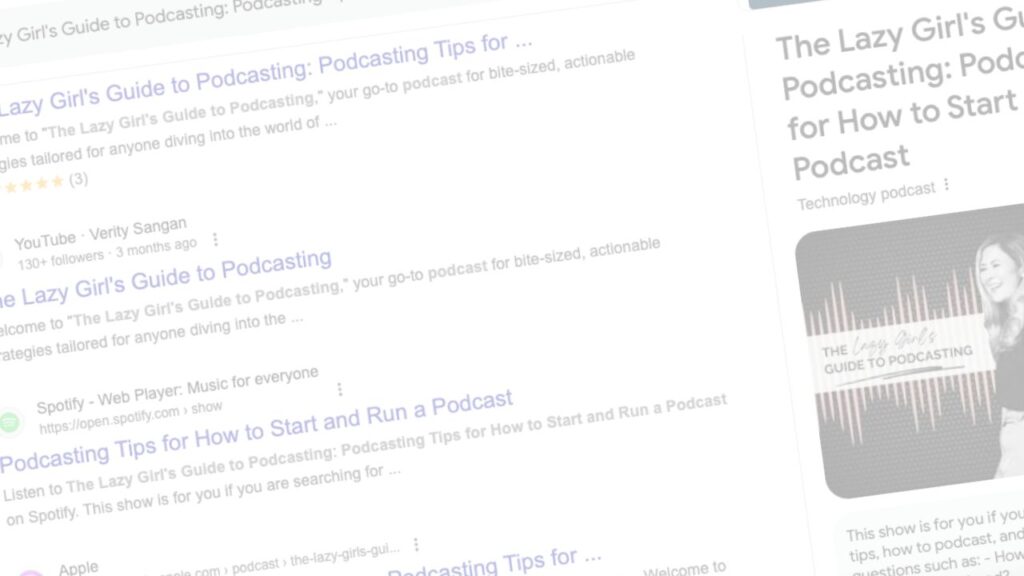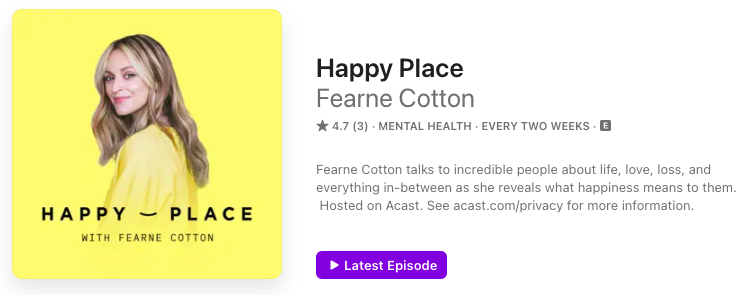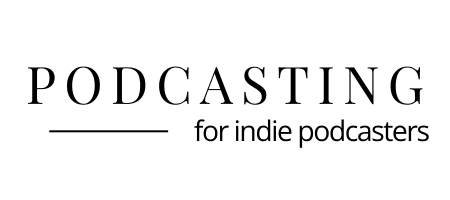
5 Ways to Make Your Podcast Episode Titles SEO-Friendly
Being able to craft perfect podcast episode titles can make or break your show’s discoverability. But do indie podcasters need to put more effort into their episode titles than celebrity podcasters? And if you are relying on search engine optimised (SEO) podcast episode titles to bring in new listeners, how do you go about creating them in the first place?
By the end of this post, you’ll understand why celebrity podcasters like Fearne Cotton can rely on minimalist titles, while indie creators like us need to craft SEO-rich ones to grow our audience. We have also included 5 ways to make your podcast episode titles more SEO-friendly, improving the likelihood of your target audience discovering your show.
What are Podcast Episode Titles?
Podcast episode titles are the first thing that potential listeners see when they come across your show.
It’s a brief description that sums up the content of the episode and invites people to press play. Think of it like the headline of an article or the title of a book; it’s your chance to grab attention and entice someone to give your podcast a try. Essentially, a good title will stop a potential listener’s scroll and encourage them to hit “Play” on your episode.
A good title is clear, intriguing, and gives your audience a reason to hit that play button. While it might seem like just a few words, getting your podcast episode titles right can make all the difference in how many people discover and engage with your content.
Does SEO Work for Podcasts?
Absolutely, SEO works for podcasts, but it’s often misunderstood.
When we think of SEO, we tend to focus on websites, but podcast directories like Apple Podcasts and Spotify also have search algorithms. The key is to optimise your episode titles and descriptions with keywords your audience might be searching for.
For example, if your podcast is about personal finance, you might use terms like “budgeting,” “saving money,” or “debt-free strategies.” By including these keywords in your titles and descriptions, you increase the chances of your podcast appearing in search results. It’s not just about stuffing keywords in, though; it’s about making sure your content is discoverable while still sounding natural and engaging.

How to Make Your Podcast More Searchable
Making your podcast more searchable starts with understanding your audience.
- What topics are they interested in?
- What questions are they asking?
Once you’ve got a clear picture of your target listeners, you can tailor your content to meet their needs. Start with your episode titles; make them specific, relevant, and keyword-rich. But don’t stop there. Your episode descriptions are just as important. Use them to expand on your title and include additional keywords and phrases that relate to your topic.
Another tip is to ensure your podcast metadata is complete and accurate. This includes your show’s category, tags, and overall description. The more information you provide, the easier it is for platforms to recommend your podcast to potential listeners.
Should Podcast Episode Titles Be Italicised or in Quotes?
The exact formatting of podcast episode titles has a lot of podcasters divided.
When it comes to whether or not your podcast episode titles should be in italics or quotes, this is another debate that might seem like a small detail, but it’s one that often sparks debate. In general, podcast episode titles don’t need to be italicised. They also don’t need to be placed in quotation marks unless you’re referring to them in written text, such as a blog post, article, or even a podcast transcript. In such cases, you can follow the style guide of your choice.
For example, some podcasters suggest using quotation marks for episode titles, whereas other styles might prefer italics. Personally, I find it easiest to stick to quotation marks when mentioning titles in writing, as it keeps things consistent and reader-friendly. Within the actual episode title itself, I don’t use italicised font or quotation marks. My preference is to have each word start with a capital letter, but that’s it.
Ultimately, it doesn’t really matter what format you choose for your podcast episode titles. piThe key is to ensure your audience knows you’re referencing an episode title, so pick one approach and stick with it.
Related Blog Post >> Podcast Titles: Should You Include Your Episode Numbers?
5 Best Practices for Crafting Effective Podcast Episode Titles
Coming up with an engaging episode title is both an art and a science. Start by thinking about what your episode is really about. What’s the central theme or the key takeaway for your audience?
A good title often hints at the benefit listeners will gain by tuning in. For instance, if your episode explores time-saving hacks, your title might be something like “Save Two Hours a Week with These Simple Productivity Tricks.”
It’s important to be specific but also leave a little intrigue; enough to make someone curious and want to listen to the episode.
Creating effective podcast episode titles is all about finding the balance between clarity and intrigue.
- First and foremost, your title should clearly reflect the content of your episode. If it’s misleading, you risk disappointing your audience and losing trust.
- Next, aim for podcast episode titles that are succinct. Long titles can get cut off on certain platforms, so keep it concise.
- Third, make your titles action-oriented when possible. Words like “how to,” “discover,” or “learn” can draw in listeners by promising value.
- Fourth, don’t shy away from emotion. Podcast episode titles that tap into curiosity, humour, or even urgency can be incredibly effective.
- And finally, test and adapt. Look at which of your past episodes performed well and see if there’s a pattern in the titles. With a bit of trial and error, you’ll find a formula that works for you.
Fearne Cotton’s Happy Place: A Case Study in Celebrity Podcasting
Fearne Cotton’s Happy Place podcast is a global success. According to Listen Notes, as of January 2025, it ranks in the top 0.01% of podcasts worldwide and boasts a listener score of 75.
That’s a colossal achievement.
And what’s even more fascinating is that only about 37% of Happy Place listeners are based in the UK, despite Fearne being a UK-based celebrity. The other 63% are tuning in from across the globe, demonstrating her incredible reach and the universal appeal of her content.
But here’s the thing: until Season 22, the titles of Happy Place episodes consisted solely of the guest’s name. No context, no hint about the episode’s content; just the guest’s name. For instance, an episode featuring Dawn French would simply be titled “Dawn French.”
For most indie podcasters, this would be a disastrous strategy.
So why does it work for Fearne Cotton?

The Power of a Celebrity Brand
Fearne Cotton’s ability to pull off minimalist episode titles boils down to one thing: her brand. Fearne has been in the public eye since her teenage years, hosting children’s TV shows before transitioning to adult presenting roles, including Radio 1 and Children in Need. She’s also an author, mental health advocate, and founder of the Happy Place movement, which includes books, festivals, and in-person events.
This long-standing career means Fearne has spent decades building a loyal audience who trust her content. People tuning in to Happy Place know what to expect: thoughtful interviews on topics like mental health, wellbeing, and personal growth. Fearne’s reputation precedes her, so she doesn’t need to entice potential listeners with SEO-rich titles.
Why Indie Podcasters Can’t Rely on Name Recognition
As indie podcasters, we don’t have the luxury of a pre-existing fan base or global recognition.
Even if you have a few thousand followers on social media, that’s not comparable to Fearne’s decades-long career and millions of followers across platforms. Without that established trust and brand recognition, it’s crucial to focus on strategies that make your podcast discoverable to new listeners.
The Importance of SEO-Rich Podcast Episode Titles
SEO is a vital tool for indie podcasters. It helps your episodes appear in search results on platforms like Apple Podcasts, Spotify, and even Google. A good title doesn’t just name the guest; it tells potential listeners what they’ll gain by tuning in. For example: instead of “Episode 43: Verity Sangan,” try “Episode 43: How to Start a Podcast for Free with Verity Sangan.”
See the difference? The second title provides context and value, making it far more likely that someone will click.
Building an Audience Takes Time
One of the hardest truths for indie podcasters is that building an audience doesn’t happen overnight.
Fearne Cotton’s Happy Place didn’t start as a global phenomenon; it grew because of her pre-existing brand and the trust she’d earned over years. As indie podcasters, we need to put in the groundwork by creating content that’s both valuable and discoverable.
Recap: Why SEO Matters for Indie Podcasters
To summarise, Fearne Cotton and other celebrity podcasters can afford minimalist episode titles because of their celebrity status and their established brands, such as Happy Place. Indie podcasters, however, need to leverage SEO to attract listeners who don’t already know them.
Here are the key takeaways if you are looking to improve your podcast episode titles:
- Understand SEO: Listen to Episodes 104 (Why SEO is So Important in Podcasting) and 107 (5 Ways to Boost Your Podcast’s Google Ranking) for a deeper dive into SEO strategies.
- Highlight Benefits: Use podcast episode titles to clearly communicate what your audience will gain from listening to you episode. But don’t make it click-bait. No-one wants to waste their time with an episode that doesn’t deliver.
- Be Specific and Strategic: Include strategic keywords and experiment with different formats of episode title to see what works best.
- Patience is Key: Building an audience takes time, and SEO is a long-game. But a strong SEO strategy can help you attract the right listeners.






